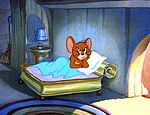Saturday Evening Puss
| Saturday Evening Puss | |
|---|---|
| Tom and Jerry series | |
 Reissue 1957 title card | |
| Directed by |
William Hanna Joseph Barbera |
| Produced by | Fred Quimby |
| Story by |
William Hanna (unc.) Joseph Barbera (unc.) |
| Voices by |
Lillian Randolph (unc.) William Hanna (unc.) |
| Music by | Scott Bradley |
| Animation by |
Ed Barge Kenneth Muse Irven Spence Ray Patterson |
| Distributed by | Metro-Goldwyn-Mayer |
| Release date(s) |
|
| Color process | Technicolor |
| Running time | 6:30 |
| Language | English |
| Preceded by | Little Quacker |
| Followed by | Texas Tom |
Saturday Evening Puss is a 1950 one-reel animated cartoon and is the 48th Tom and Jerry short directed by William Hanna and Joseph Barbera who created the cat and mouse duo ten years earlier. The cartoon was produced by Fred Quimby, scored by Scott Bradley and animated by Ed Barge, Kenneth Muse, Irven Spence and Ray Patterson.
Plot
Mammy dresses up before preparing to leave for the Lucky Seven Saturday Night Bridge Club. As she leaves, Tom was very happy and rushes to the living room window. He whistles to Butch, Lightning and Topsy to get their attention and rush in when Tom gives them the all-clear by showing them a sign reading O.K. FOR THE PARTY and start to play loud jazz music. Also, Tom gives sandwiches to Lightning and Topsy and pie for Butch.

But the noise has disrupted Jerry from getting his beauty sleep. Unsurprisingly, his complaints to Tom fall upon unsympathetic ears and meet with no success. Jerry's being outmaneuvered by the four cats, so he attempts to disrupt the proceedings personally. Unfortunately, now the cats do not appreciate Jerry's desperate acts and go on the warpath.
The party soon starts up again after Jerry flees into his mouse hole (and after Tom then turns the recorder back on) before Jerry pulls the plug on the phonograph and Topsy begins the chase again, trying to flatten Jerry but instead getting four taunting caricatures of Jerry imprinted on the trash can lid. Jerry sees the other cats approaching and flees through an open 2-section door, closing the top section such that all three cats run into it.
Jerry runs into Topsy coming from the other direction as he rounds a corner, so he hides behind the curtain and steals the lid. Topsy then runs back the other way, but runs into his own lid. The chase then resumes again, eventually leading Jerry into Tom's trap which causes Jerry to be flattened and Tom proceeds to tie him up with the windowsill string before he and the other alley cats start to play the loud jazz music once again. Jerry has had enough, so he swings down to the nearest table and uses the telephone to report Tom's activities to Mammy Two Shoes.
Mammy is seen playing bridge with her friends when Jerry calls and tells her about the cat's party. She races back home at 90 miles an hour (briefly showing her face) and crashes onto the door, knocking it off the wall and causing it to slide to a halt in front of the cats. Tom opens the door and sees Mammy standing there with her hands on her hips. She pointing at him shouts, "Thomas!". Being aware that his life is in imminent danger, Tom slams the door onto Mammy's arm and hastens with his pals. However, Mammmy's hand punches in through the door dragging him backwards by the very end of the tail. The scene cuts to outside where the whole house shakes, then the roofs fly off before the door opens and the cats are thrown out one by one into a street wall, forming a totem pole. Mammy is upset over the fact that the cats ruined her entire evening. But to Jerry's dismay, she decides to relax by playing the same jazz recording that the cats were playing, leaving him no better than before.
Voice cast
- Lillian Randolph as Mammy Two Shoes (original version, uncredited)
- June Foray as Thin White Lady (re-animated version, uncredited)
- Thea Vidale as Mammy Two Shoes (redubbed version, uncredited)
- William Hanna as Jerry (uncredited)
Censorship


- On CBS (back in the 1960s), Mammy Two Shoes was redrawn as a white teenage girl, and her night out at the Lucky Seven Bridge Club was redone as a night out dancing with her boyfriend. Her voice was provided by June Foray.[1]
- Some versions of this cartoon past the 1960s air either with Mammy Two Shoes' voice redubbed or with Mammy as a white teenage girl voiced by June Foray (though one version exists in which, due to an audio mix-up, the white teenage girl has Mammy Two Shoes' original voice).
- Cartoon Network's version has Mammy Two Shoes' voice redubbed with a less stereotypical voice and, for reasons unknown, mutes out Jerry's voice when he complains to Tom about the noise.
References
- ↑ "Censored MGM Cartoons". looney.goldenagecartoons.com. Archived from the original on February 5, 2007. Retrieved February 5, 2007.
External links
- Saturday Evening Puss at the Big Cartoon DataBase
- Saturday Evening Puss at the Internet Movie Database